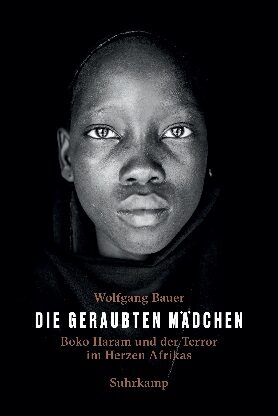Wolfgang BauerAndy Spyra
Die geraubten Mädchen. Boko Haram und der Terror im Herzen Afrikas
[Stolen Girls. Survivors of Boko Haram Tell Their Story]
- Suhrkamp Verlag
- Berlin 2016
- ISBN 978-3-518-42538-1
- 189 Pages
- Publisher’s contact details
Wolfgang Bauer
Die geraubten Mädchen. Boko Haram und der Terror im Herzen Afrikas
[Stolen Girls. Survivors of Boko Haram Tell Their Story]
Published in Arabic with a grant from Litrix.de.
Sample translations
Consequences of a Corrupt State: The Terror of Boko Haram
The first chapter is called "The Forest," referring to the swampy Sambisa forest that the kidnapped women and children from Duhu, Gubla and Gulak were taken to. These women and children, whom the Zeit reporter was able to talk to in July 2015 and January 2016, were abducted, forced into marriage and abused by Boko Haram fighters. The fact that they managed to flee does not mean they’re now in safety, for Boko Haram is still on the rampage, and more so than ever – in other regions too. What’s more, all of these women have lost family members, friends and neighbors, have seen and suffered unspeakable atrocities. The Boko Haram terror group "has killed the most people in recent years, more than the Islamic State. As deadly as it is, we know very little about it," writers Bauer. How should a journalist talk about this criminal regime, how can we wrap our minds around it? "We can only fight this terror successfully," writes the Zeit reporter, "when we listen to its victims: the women." It’s the impressive voices of Sadiya and Talatu, of Batula and Rabi, Sakinah and Isa, Clara and Lydia that leave their mark on this book and reverberate in the reader’s mind long after putting it down. It is Sadiya and Talatu, mother and daughter in the first chapter, who tell about their lives – before, during and after their abduction by Boko Haram militias. Their story is similar to that of thousands of women who were carried off to Sambisa forest as slaves after their villages were conquered by Boko Haram troops. When these women tell their story, however, we come to know their personal lives and the rural surroundings they live in.
The widow Sadyia sold bean cakes at a bus stop in Duhu; her daughter Talatu dreams of becoming a doctor. Forty-one-year-old Batula and her daughter Rabi were in captivity for months as well. When their village was taken by terrorists, they had to look on as the men were decapitated. Dragged off to the Sambisa forest, they were forced into marriage and raped. The leader of the group, Abubakar Shekau, who lives in the forest, had the women brutally abused. The schoolgirls kidnapped from Chibok in 2014, whose plight went viral with the "Bring Back Our Girls" campaign, were indoctrinated by Boko Haram and had to give lessons in Islam to the newly arriving girls.
Alternating with these female voices, the author explains the origins and history of this Islamicist terror group. Bauer masters this difficult task as well, describing a world marked by unfathomable brutality without falling into sensationalism or flaunting his inside knowledge. A key factor in Boko Haram’s evolution, the reporter concludes, is the weak Nigerian state. Ubiquitous corruption and the lawlessness resulting from this has created a situation in which the promises of radical preachers fell on fertile soil – namely, establishing law and order again with the aid of sharia. "Officially there are 330,000 policemen in Nigeria, but almost a third of these are busy protecting high-ranking politicians and businessmen in exchange for perks and bonuses." The regime under President Goodluck Jonathan was marked by elites enriching themselves. President Buhari, in office since 2015, may have promised anti-corruption measures, but the brunt of the struggle against Boko Haram is "still borne by neighboring states like Chad, Niger and Cameroon," according to Bauer.
That Boko Haram has transformed itself from fundamentalist guerrilla troops into a veritable army since 2010 is also the fault of a government that for many years cared little about the country’s Muslim North. And its belated military measures against Boko Haram were dubious at best. The women Bauer talked to mentioned fighter planes that destroyed their villages with no regard for civilian lives, and said that Boko Haram used them as human shields.
Bauer describes how the "chief emir" Abubakar Shekau is increasingly gaining ground and influence, how he claims to use witchcraft, how his propaganda works, how Boko Haram is gradually networking with ISIS and training its fighters in the Middle East. It is the advancing internationalization of terrorism that makes the Boko Haram phenomenon an increasing threat, one that can’t be held back with short-term military operations. This reportage book of Wolfgang Bauer, whose interview transcripts and background reports are supplemented by the stark black-and-white photographs of Andy Spyra, shows how urgent it is to open our eyes and look. "Globalization has done away with the outside world. Many of us have yet to understand this. Or don’t want to understand it, out of fear. In recent years the outside world has merged with the inside one." In the end, though, it’s the courage and strength of these women who – however absurd it may seem, given the extent of the horrors they’ve seen – ultimately inspire something like hope.
Translated by David Burnett

By Jutta Person
Jutta Person, born 1971 in South Baden, studied German, Italian and Philosophy in Cologne and Italy, and gained a doctorate with a dissertation on the history of physiognomy in the 19th century. A journalist and cultural commentator, she is based in Berlin and writes for the Süddeutsche Zeitung, Die Zeit and Philosophie Magazin. From 2004 to 2007 she was an editor at Literaturen; since 2011 she has been in charge of the books section at Philosophie Magazin.
(Updated: 2020)
Publisher's Summary
In the night from April 14th to April 15th 2014, members of the terrorist organization Boko Haram raided the small town of Chibok in the Northeastern part of Nigeria and abducted 276 young girls from the local boarding school. The event caused massive outrage across the globe. Under the hashtag »Bring Back Our Girls«, politicians, activists and celebrities from all around the world, among them First Lady Michelle Obama and recipient of the Nobel Peace Prize Malala Yousafzai, stood up to raise attention and lend their voices to those held captive.
Acclaimed journalist Wolfgang Bauer from the German newspaper Die Zeit has managed to find and meet some of the girls who suffered a similar fate but were able to escape. In his new book, he makes sure they can finally speak for themselves – about their lives before the abduction, about the horrors during their captivity and their dreams of a better future in freedom.
Bauer diligently examines the historical and political background of the Islamist terror in the heart of Africa and describes the damage it has done to the fragile balance of ethnicities and cultures in one of the most diverse regions of the world. His book tells a story of violence, fear and uncertainty but also a story of hope, of strength and of courage.
(Text: Suhrkamp Verlag)
